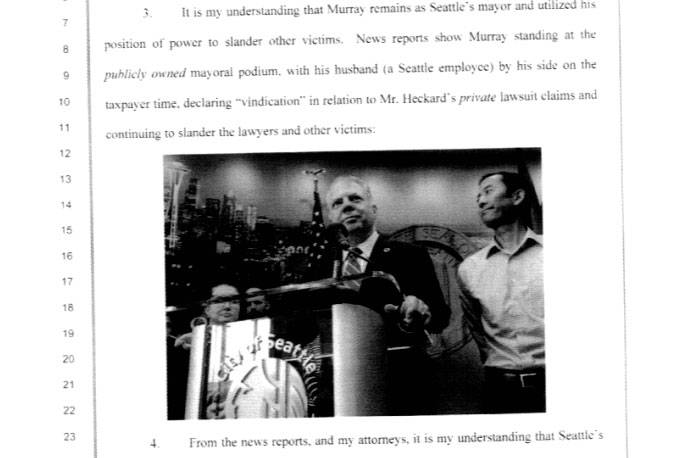It was supposed to have been a triumphant moment for the mayor. Instead it has played a central role in his downfall.
On June 14, Delvonn Heckard dropped his lawsuit against Mayor Ed Murray, in which he accused Murray of sexually abusing him when he was underage and living on the streets of Seattle in the mid-1980s.
That afternoon, Murray called the press to City Hall to discuss what he saw as the clear implications of Heckard dropping the suit: That the accusations had been false and that Heckard was dropping the suit because his—and his lawyers’—goal of destroying Murray’s political career had been realized.
In addition to lashing out at Heckard’s lawyers, Murray lashed out at the press as well.
He admonished the media for not doing enough research into his relationship with Jeff Simpson, a troubled teen Murray served as a foster parent for and who also accused Murray of sexual abuse in the early 1980s.
About Simpson, he said: “If the press had asked, they could have asked the school, that when he wasn’t in school I would call the police. That I put him in drug treatment. That when he had problems with me being gay, I got his school counselor to counsel him,” he told reporters. “All those records exist. Also that a prosecutor and grand jury investigated [the abuse allegation] and did not pursue it.”
A little later, his husband, Michael Shiosaki, put a finer point on it with a direct jab at the press corps gathered around him: “Do your homework.”
Murray was so bullish that day he even raised the prospect of running for re-election as a write-in candidate.
As things have happened, though, that press conference has come back to haunt Murray, who will resign at 5 p.m. Wednesday in the wake of a fifth accusation of child sex abuse, this one from a cousin.
First, in part by invoking Murray’s own request for reporters to pursue records about him and Simpson, Seattle Times reporters Lewis Kamb and Jim Brunner did some more homework about Simpson’s accusations, and in mid-July published details of a child protective service investigation from the time of the alleged abuse that determined Simpson was telling the truth.
“Among reasons the agency should disclose details from the file that were initially deemed private, The Times provided the alleged victim’s authorization to release details of the abuse investigation, and cited Murray’s statements urging the media to pursue existing records,” Kamb wrote in a story accompanying the new revelations.
Those records, for a moment, looked like they were going to sink Murray. Following their publication, Councilmember M. Lorena Gonzalez, a former Murray staffer who was considered a Murray ally, called for him to resign, and threatened to start removal procedures in Council if he didn’t. However, Gonzalez was quickly met with resistance from other councilmembers and the effort stalled.
Then, on Tuesday, Murray’s cousin filed a declaration in Heckard’s lawsuit stating that he, too, was molested by Murray when he was underage. The declaration also made a point to note Murray’s June press conference.
“It is my understanding that Murray remains as Seattle’s mayor and utilizes his position of power to slander other victims. News reports show Murray standing at the publicly owned mayoral podium, with his husband (a Seattle employee) by his side on the taxpayer time, declaring ‘vindication’ in relation to Mr. Heckard’s private lawsuit claims and continuing to slander the lawyers and other victims,” Joseph Dyer writes in the declaration (emphasis his.) The declaration includes an Associated Press photo from the press conference.
Dyer’s declaration alleging abuse, as well as details he shared with the Times, finally did the mayor in. By 1 p.m. he announced he would be resigning.
He has not yet called a press conference.
dperson@seattleweekly.com








